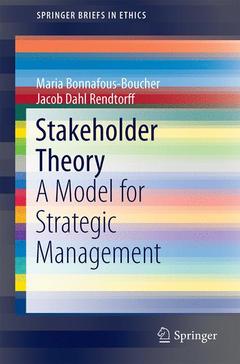Stakeholder Theory, 1st ed. 2016 A Model for Strategic Management SpringerBriefs in Ethics Series

This book provides an academic introduction to, and presentation and defence of stakeholder theory as a model for the strategic management of businesses and corporations, as well as of public organizations and institutions. The concept of the stakeholder is generally applied to parties that affect or are affected by the activities of private or public organizations. Distinct from shareholders, stakeholders are those individuals, entities or communities that have a connection with the activities of a corporation, a firm or an organization. The notion of the stakeholder is intimately linked to a conception of the business firm as an entity founded on negotiated governance, in which the maximization of value for the shareholder is not the ultimate criterion. In this model, issues and interests that are not directly associated with shareholders and investors, but which go beyond capital to encompass the concerns of civil society, are considered to be of central importance. This book provides a broad overview of stakeholder theory, presenting it as an ethical approach to strategic management that is both pragmatic and applicable to developing democratic practices within corporations, while at the same time suggesting ways in which elements of a social contract can be elaborated within the context of globalization.
Maria Bonnafous-Boucher, PhD, HDR Paris-Dauphine University, is currently Deputy Counsellor at the Embassy of France in Turkey. Previously Director of Research at Novancia Business School, Paris, and Vice-President in charge of Research at EBEN France, she is the author of several books and articles on stakeholder theory and governance, including Stakeholder Theory , Palgrave, 2005; Décider avec les parties prenantes (“Making decisions with stakeholders”), La Découverte, 2006; “Towards a stakeholder society: stakeholder theory vs the theory of civil society in European Management Review, special issue, “Re-thinking the firm in a post-crisis world”, eds., Freeman E. and Zollo, M., 2010; and La théorie des parties prenantes (“Stakeholder Theory”), La Découverte, 2014. In 2016, she was awarded the FORDE Prize (France, Rennes School of Law and Business Studies) for the body of her work on stakeholder theory.<
Born in 1965, Jacob Dahl Rendtorff, PhD and dr. scient. adm. is Associate Professor of Responsibility, Ethics and Legitimacy of Corporations at Roskilde University, Denmark. Rendtorff has a research background in ethics, business ethics, bioethics, information ethics, political theory and the philosophy of law. He has written a substantial number of articles and twelve books on existentialism and hermeneutics, French philosophy, ethics, bioethics and business ethics, as well as the philosophy of law, and has either co-authored or edited a dozen more. Notable amongst them are Basic Ethical Principles in European Bioethics and Biolaw, Copenhagen and Barcelona, 2000 (with Peter Kemp); and Responsibility, Ethics and Legitimacy of Corporations, Copenhagen Business School Press, Copenhagen 2009. More recently, he published French Philosophy and Social Theory. A Perspective for Ethics and Philosophy of Management, Ethical Economy Series, Springer 2014. Rendtorff is also one of the edito
Proposes a non-descriptive version of stakeholder theory
Shows how elements of this strategic management theory have spread to other fields, including political science, international relations, political and moral philosophy, and organizational studies.
Shows how stakeholder theory can be used as a strategic management approach that is both pragmatic and applicable to developing democratic practices within corporations
Provides an academic introduction to and presentation of stakeholder theory
Date de parution : 11-2016
Ouvrage de 92 p.
15.5x23.5 cm
Thème de Stakeholder Theory :
Mots-clés :
stakeholder theory; stakeholder management; the concept of stakeholder; business studies and ethics; philosophical foundations of stakeholder theory; conceptual framework for business ethics; epistemological debates; theoretical pluralism; identifying stakeholders; critiques of stakeholder theory; strategic management; stakeholder theory in corporate strategy; the stakeholder wheel; strategic marketing and research in negotiation; a theory of organizations



